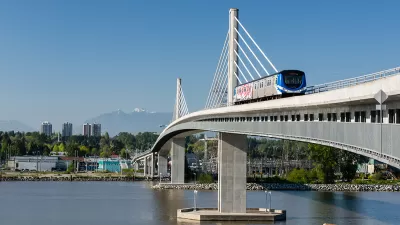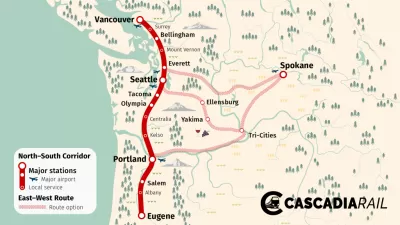The state of Washington has taken a first, serious look at a high-speed rail project linking Vancouver in British Columbia to Seattle and Portland.

Jennifer Saltman reports: "An ultra-high-speed rail line linking Vancouver to Seattle and Portland would cost between $24 billion and $42 billion US and attract around 1.8 million riders per year, according to a study conducted by Washington’s department of transportation [pdf]."
The report examines "five conceptual routes and narrowed it down to three primary corridors," according to Saltman.
The first would begin at Vancouver International Airport and make a total of seven stops, including downtown Seattle and the Rose Quarter station in Portland. This route has the highest potential ridership of about two million annually by 2035.
The report also compared the costs and benefits of three technologies—high-speed rail, maglev, and the Hyperloop. On the latter technology, the report is diplomatic but skeptical: "It is not anticipated that hyperloop technologies will be ready for commercial viability for at least the next decade, and viability is highly dependent on regulatory acceptance of the technology."
FULL STORY: Vancouver to Seattle in an hour? Ultrafast rail study brings it one step closer

Maui's Vacation Rental Debate Turns Ugly
Verbal attacks, misinformation campaigns and fistfights plague a high-stakes debate to convert thousands of vacation rentals into long-term housing.

Planetizen Federal Action Tracker
A weekly monitor of how Trump’s orders and actions are impacting planners and planning in America.

In Urban Planning, AI Prompting Could be the New Design Thinking
Creativity has long been key to great urban design. What if we see AI as our new creative partner?

Pedestrian Deaths Drop, Remain Twice as High as in 2009
Fatalities declined by 4 percent in 2024, but the U.S. is still nowhere close to ‘Vision Zero.’

King County Supportive Housing Program Offers Hope for Unhoused Residents
The county is taking a ‘Housing First’ approach that prioritizes getting people into housing, then offering wraparound supportive services.

Researchers Use AI to Get Clearer Picture of US Housing
Analysts are using artificial intelligence to supercharge their research by allowing them to comb through data faster. Though these AI tools can be error prone, they save time and housing researchers are optimistic about the future.
Urban Design for Planners 1: Software Tools
This six-course series explores essential urban design concepts using open source software and equips planners with the tools they need to participate fully in the urban design process.
Planning for Universal Design
Learn the tools for implementing Universal Design in planning regulations.
planning NEXT
Appalachian Highlands Housing Partners
Mpact (founded as Rail~Volution)
City of Camden Redevelopment Agency
City of Astoria
City of Portland
City of Laramie




























